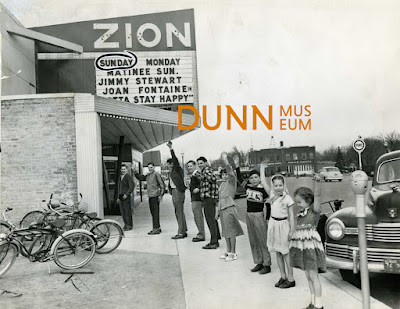Zion movie theater, March 1951. Chicago Sun-Times photograph. Dunn Museum 2012.10.1
Zion's blue laws went into effect with the founding of the city in 1901. Blue laws have been used since Colonial times and originally were directed at prohibiting personal activities such as gambling and the consumption of alcohol. In the 19th century, state and local governments began passing blue laws (based on Christian beliefs of keeping the Sabbath holy) that forbade businesses from operating on Sunday.
The Zion theater owners pointed out that the ordinance was already violated by restaurants and drug stores, and the annual Zion Passion Play, which charged admission, also conducted business on Sunday.
Three of the theater's owners were Lake County board supervisors—Martin B. Ruesch, Edwin Gus Peterson, and Frank L. Davis.
On Sunday, April 11, 1948, the owners of the theater and neighboring bowling alley opened their businesses and were promptly arrested.
Zion Bowling Lanes with Zion Hotel visible in the distance, circa 1955. Dunn Museum.
Zion's Chief of Police Alven Ruesch, bearing a complaint issued by Mayor Richard Hire, arrested Onnie Bridges (the police chief's brother-in-law) at the theater, and then went down the street to the bowling alley and arrested Otto Lawrence.
The ban on Sunday movies (and other "amusements") was upheld by Judge Ralph Dady of the Circuit Court in Waukegan in August 1948. Following this ruling, the movie theater owners circulated a petition requesting a special election to determine whether the ban on Sunday business should be repealed.
Despite a vigorous campaign, on December 21, 1948, Zion residents voted to retain the "blue laws" by a vote of 1,756 to 1,564. The city council then voted to enforce prohibiting Sunday trade, including the sale and delivery of ice cream, milk, and newspapers.
Downtown Zion, circa 1956. Dunn Museum 2000.2.9
Business owners continued to work toward the repeal, and on April 5, 1949, another vote of Zion residents was taken. This time voters were in favor of the repeal—1,746 to 966, bringing 48 years of blue laws in Zion to an end.
Children standing in line at the Zion Theater. Their arms are in the air celebrating the repeal of the blue laws, allowing movies to be shown on Sundays. Chicago Sun-Times photograph, April 11, 1949. Dunn Museum 2012.10.7
In 1950 and 1951, proponents of the blue laws brought the issue back to voters, who voted against their reinstatement.
In May 1959, the Zion movie theater announced its closing. Onnie Bridges, president of the Zion Theater corporation, stated that "the closing was dictated by his desire to retire rather than failing audiences."
Special thanks to museum volunteer Al Westerman for assisting with this research.





5 comments:
I thought this was very interesting.
Seems like only yesterday
Being born in Zion during these times, I'm surprised I turned out as well as I have.
I remember my mom (who owned a Beauty Shop in Zion "Johnnies Beauty Shop") taking me to see "Swiss Family Robinson" at the Theatre. I think it was summer of 1958 or 1959. It was great! I grew up in Zion and I am proud of it! It was like Mayberry when I grew up!
My parents bought the bowling alley and re-opened it in the early 90's. Have never seen what the original building actually looked like. So cool
Post a Comment